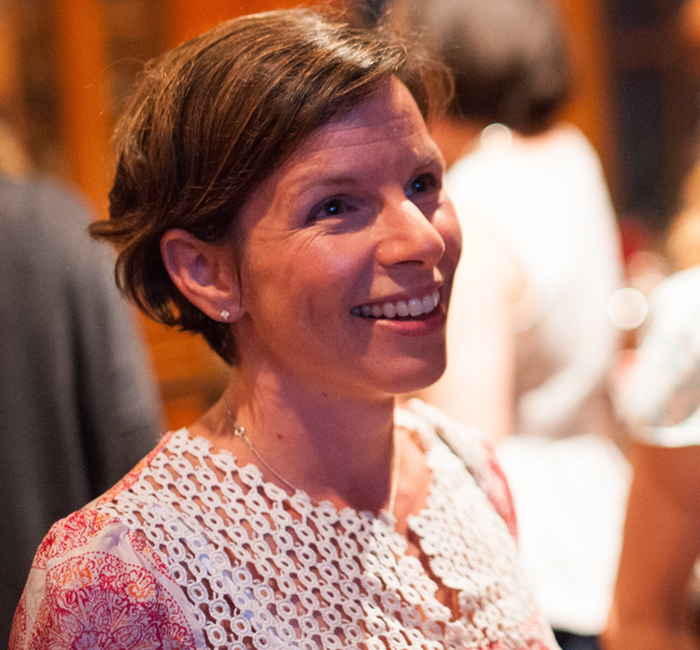Sara Sutton Fell is the CEO and Founder of FlexJobs, an award-winning, innovative career website for telecommuting, flexible, freelance, and part-time job listings, and Founder of 1 Million for Work Flexibility, an initiative dedicated to promoting flexible work options for all. Having worked in the world of online job searching since 1995, Sara is an advocate for legitimate flexible work opportunities, and she lives in Boulder, Colorado with her husband and two young sons.
Why does the world need a work revolution? (In other words: the way we’re working isn’t working. Why not?)
I think a key component of any working relationship is missing from workplaces today: trust. The traditional way management oversees employees isn’t built on a foundation of trust, so a huge amount of time and energy is spent monitoring employees, making sure they’re “doing their jobs.” I believe in starting from a place of trust, then supporting employees to empower them to be productive and motivated to work. And of course, trust is the key to workplace flexibility, because it assumes that employees are trustworthy and gives them the chance to structure their work in a way that works best for them AND the company. In a way, I think we need a workplace trust revolution.
How are you or your organization reinventing work in some way (big or small)?
We are proving that you can create a vibrant, healthy, collaborate company with a fantastic company culture — and do it virtually. Also, the nature of our business is that we carry this reinvention through to the companies and job-seekers we work with, in helping them to fill/find jobs that are remote or otherwise flexible.
Why do you do what you do?
Because it makes sense to me. There is so much workforce technology that supports mobility and flexibility, and there is critical need for better work-life balance with most families being dual-income families or single parent families. The fact that there are economic, social, and environmental benefits for both employers and employees makes it a win-win, and I want to help this fact become common knowledge. It will do our society well.
What kind of art (any kind) do you like and why? Any recommendations we should know about?
I love art in general, and personally considered being a painter when I was younger. However, my passion for art has taken a backburner, and really only comes out in crafts with my kids or cooking nowadays.
What is one specific thing your company does that makes your culture unique and/or different?
I think the biggest thing is that at FlexJobs everyone works from home. To go even further, we are a decentralized company so everyone works from different states and there’s no main corporate office. This works for us in several ways. One, it allows us to hire the best people regardless of geographic location. Two, it allows our staffers to have better work-life balance, and to be more productive.
What is one discipline/industry totally different from your own that has inspired you? How does it impact your work?
Environmental policy and management. It’s an area that I’ve been highly interested in since high school, when I became a budding environmentalist. I find the growth and challenges similar to those that I encounter in the flexible work arena. Both are about finding better and more modern, comprehensive, healthy, and sustainable approaches to how we live/work on this planet, while also having to understand the financial impacts and incentives that fund the efforts. I also find similar frustrations in the two areas in how slow the “mainstream” is to understand and adapt to the changes that make sense to happen, not only to make the quality of “our” lives better (people living and working today), but also for the many benefits that extend far beyond us – better health, economic incentives, stronger community infrastructures, sustainability, etc. I also find it interesting that “work flexibility” and “environmental policy” are two areas in which people often turn a blind eye, thinking that it has nothing to do with them. And how they are just so wrong. Both will affect them in real ways, although more subtly for some than others.
What’s one tangible and concrete technique other organizations should use if they want to create a more human and/or meaningful place to work?
Offer work flexibility. By doing so, you are helping to acknowledge that your employees are people, with lives outside of work, which not only is a sign of respect for your employees but also will help to reduce competition and conflict between work and their lives. And when you reduce that competition and conflict, you reduce stress and increase engagement. It’s a win-win.
What piece of technology (other than your laptop/smartphone/tablet) could you not live without and why?
A dual monitor… truly, I don’t think I could ever go back without seriously sacrificing productivity and sanity. Being a web-based company, I work from my computer the vast majority of the time, and even if I’m not using them simultaneously, I have tons of browsers and documents opened on my computer for quick reference, so having two monitors is absolutely essential.
What does your preferred work environment look like?
My home office! Lots of natural light, personal mementos, items that give me inspiration. And I’m very happy that my entire staff can make their home offices into their preferred work environments too. I think the more comfortable you are in your work environment, the happier, more productive, and more creative you’ll be.
What do you do for fun?
First and foremost, spend time with my kids, family, and friends. My favorite activities — cooking, mountain biking, Bikram yoga, ski, and hiking.
Where in the world are you?
Boulder, Colorado
How can people connect with you?
1 Million for Work Flexibility – www.workflexibility.org
Twitter – http://www.twitter.com/workflexibility
Facebook – http://www.facebook.com/1MforWorkFlexibility
Google+ – https://plus.google.com/+WorkflexibilityOrg
LinkedIn – http://www.linkedin.com/groups?gid=6545580


